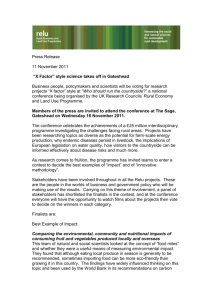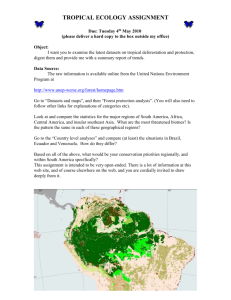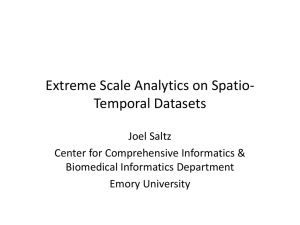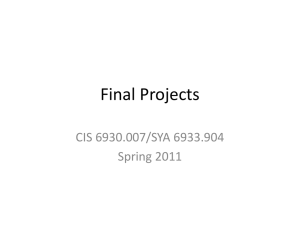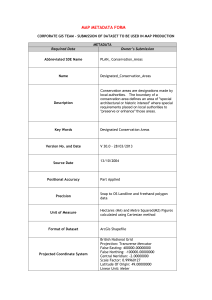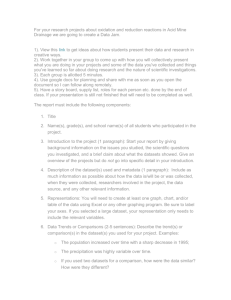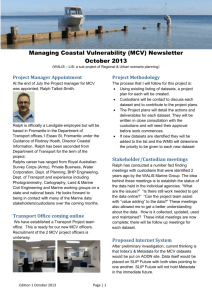Rural Economy and Land Use Programme Data
advertisement
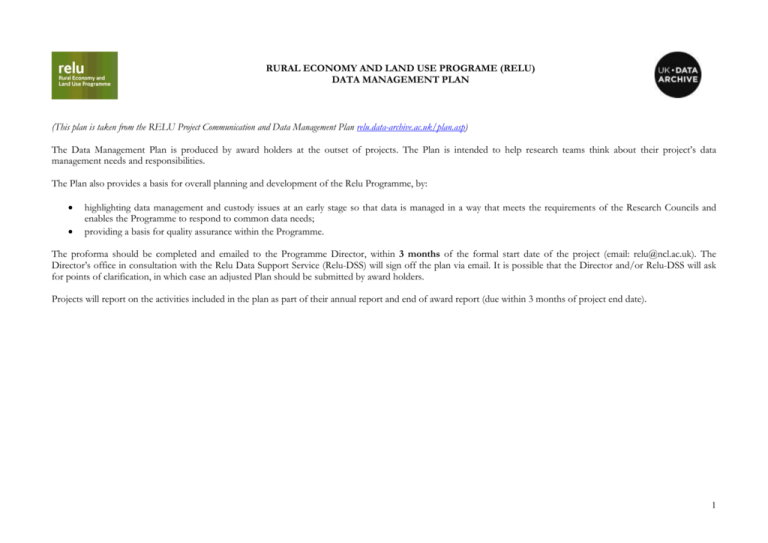
RURAL ECONOMY AND LAND USE PROGRAME (RELU) DATA MANAGEMENT PLAN (This plan is taken from the RELU Project Communication and Data Management Plan relu.data-archive.ac.uk/plan.asp) The Data Management Plan is produced by award holders at the outset of projects. The Plan is intended to help research teams think about their project’s data management needs and responsibilities. The Plan also provides a basis for overall planning and development of the Relu Programme, by: highlighting data management and custody issues at an early stage so that data is managed in a way that meets the requirements of the Research Councils and enables the Programme to respond to common data needs; providing a basis for quality assurance within the Programme. The proforma should be completed and emailed to the Programme Director, within 3 months of the formal start date of the project (email: relu@ncl.ac.uk). The Director’s office in consultation with the Relu Data Support Service (Relu-DSS) will sign off the plan via email. It is possible that the Director and/or Relu-DSS will ask for points of clarification, in which case an adjusted Plan should be submitted by award holders. Projects will report on the activities included in the plan as part of their annual report and end of award report (due within 3 months of project end date). 1 SECTION 1: PROJECT DETAILS 1.1 PROJECT DETAILS Project Title Award No Principal Investigator (PI) Address of PI PI Tel PI email Start / End Dates of Award Including any extensions agreed with ESRC Total Research Council Funding from __________ to ___________ SECTION 3: DATA MANAGEMENT This section of the Plan covers issues concerning data management. It concerns all qualitative and quantitative data generated by the project. All research data must be well managed by the researchers throughout the project and made available for archiving at established Research Council data centres. The Relu Data Support Service (relu.data-archive.ac.uk) provides researchers with advice and support on data management and archiving. Before completing the section please read the Relu Data Management Policy at www.relu.ac.uk/about/Data%20Management%20Plan.pdf. Please refer to the accompanying Guidance Notes (Annex A) for completing the form. Award holders will be required to provide full metadata* together with a description of the datasets which their project generates. The technical arrangements for data management and archiving (including decisions concerning final archiving destination for project datasets; formats for supply of data; licence agreements; IPR etc.) will need to be subsequently agreed with the RELU Data Support Service (DSSRELU@essex.ac.uk). Award holders will be required to meet/liaise with Relu-DSS at appropriate intervals to report progress, resolve problems and exchange information. * Metadata is the information necessary to interpret, understand and use a given dataset without reference to the original data collector, for example the dataset’s title, summary, principal investigator and so on. Example metadata entries are provided in the guidance notes. 3.1 REQUIREMENTS FOR ACCESS TO EXISTING DATASETS Please list and describe any existing datasets which will need to be acquired for the research to be carried out (third party data sources). Please also identify any specific issues relating to access to these data and how you will overcome any difficulties. Please add extra rows where necessary. 2 Dataset name E.g. British Crime Survey (BCS)2002-3 3.2 Description of dataset The BCS is one of the largest regular social surveys conducted in Britain and is primarily a 'victimisation' survey, in which respondents are asked about the experiences of property crimes of the household and personal crimes which they themselves have experienced. Data owner/source Home Office Access issues Downloadable access to registered users via the ESDS one-stop federated access management user authentication DATASETS TO BE PRODUCED Please list the quantitative and qualitative data that will be collected or generated by the project, together with a brief summary of each dataset (description and methodology), its format and how it will be managed and stored. Please add extra rows where necessary. Dataset name E.g. Hydrochemical Data from the Triassic Sandstone Aquifer in Birmingham E.g. Qualitative interviews with farmers 3.3 Summary (description/methods) Hydrochemical data will be collected manually through field determinations, and from laboratory analysis of water samples. This information will be copied into a digital format and the raw data will be kept in a dated and countersigned lab notebook. Alternative methods using isotopes as pollution markers will be recorded, archived and submitted with the dataset. In-depth interviews with around 20 farmers covering attitudes, objectives and economics of their business. Interviews will be recorded, fully transcribed, checked and an anonymised copy made. Format Excel spreadsheet Dataset management and storage To be kept on a networked drive at the University of xx. Access will be controlled by the data manager. MS Word documents and analysed in NVivo All versions of digital data (text and audio recordings) will be stored on Centre’s networked drive. QUALITY ISSUES Please briefly describe the procedures for quality assurance that will be carried out on the datasets. Quality issues to be addressed could be at the time of data collection, data entry, digitisation or data checking. For example include: documenting the calibration of instruments, the collection of duplicate samples, data entry methods, data entry validation techniques, methods of transcription. 3 3.4 DATA BACK-UP PROCEDURES Please describe the data back-up procedures that you will adopt to ensure the data and metadata are securely stored. Methods of version control should also be stated. For example: collected digital data held on the University’s networked drive are backed up nightly on a networked hard drive, as well as transferred on a weekly basis to an external hard drive, which will be stored in the University fire safe. 3.5 DATA AVAILABILITY The Research Councils require all RELU data to be made available for long-term, post-project archiving within the Research Councils’ data centres so they can be made available for secondary research. Do you envisage any difficulties in making data available for archiving, for example due to confidentiality agreements, access constraints or licence conditions of third party datasets used? If so, how might these difficulties be overcome, for example by discussing archiving with interviewees, gaining specific consent from participants to archive data, anonymising data? It is expected that informed consent to share and archive research data is gained from participants. 3.6 DATA COPYRIGHT/ IPR OWNERSHIP Please state who owns the copyright/IPR of the datasets that you have collected. 3.7 DATA MANAGEMENT RESPONSIBILITIES Please identify the first point of contact for data management issues, including metadata and quality issues. If different people are responsible for different datasets, please specify below. First point of contact for data issues Other data management responsibility Other data management responsibility Other data management responsibility Name Institution Email and tel. no. Name Institution Email and tel. no. Name Institution Email and tel. no. Name Institution Email and tel. no. 4 ANNEX A: GUIDANCE NOTES FOR COMPLETING THE RELU PROJECT DATA MANAGEMENT PLAN Before completing the Plan, we recommend that you refer to the Relu-DSS guidance on data management (relu.data-archive.ac.uk/managing.asp) and the Managing and Sharing Data best practice guide (www.data-archive.ac.uk/media/2894/managingsharing.pdf). SECTION 3: DATA MANAGEMENT 3.1 REQUIREMENTS FOR ACCESS TO EXISTING DATASETS If you intend to use datasets from third parties (for example land cover, soil or census data) then please record these here. For each dataset specify its name, a brief description, the data owner or source and any access issues you perceive in acquiring it, such as cost or licence restrictions. Contact the Relu-DSS if you have difficulties accessing data, as they may be able to help, or consult the Relu Data Resources Portal at: relu.data-archive.ac.uk/dataresources.asp. 3.2 DATASETS TO BE PRODUCED Please provide details of the datasets you expect to produce during the project. For each proposed dataset, please describe briefly how the data will be collected (description and methods), the format in which it will be collected and an indication of how it will be managed and stored. If standard methods or procedures are to be used in the production of datasets, please either provide references for these or else a brief description of the methodology and how it will be stored for submission with the datasets at a later date. Please note that statistical and model outputs with descriptions should also be treated as datasets. 3.3 QUALITY ISSUES There are various guiding documents on project management and quality issues that can be consulted for best practice. For example, the BBSRC/Defra/FSA/NERC Joint Code Of Practice For Research (www.defra.gov.uk/evidence/science/how/documents/QACoP-V8.pdf) and the requirements of the international standard BS ISO 9001:2000 that may need to be considered for some kinds of data. The following are issues that may be of specific importance to data production and management: Project planning and research design, including for example: o Setting realistic milestones and re-evaluating them at intervals o Collection of duplicate sample data o Comparison with known standards Documentation of procedures and methods, including: o Version control of amended documents Maintenance and calibration of equipment Maintenance of electronic and paper records of outputs, including: o Labelled primary data and accompanying metadata o Labelled processed information (and its connection to primary data) o Explanation of non-standard acronyms o Inclusion of measurement units as required 5 o o Validation of the transfer from paper records to electronic format Version control of amended data Please indicate briefly your strategy for managing the quality issues you see as most important to your project. 3.4 DATA BACK-UP PROCEDURES Please specify your data back up-procedures. All data should be backed-up to prevent its loss, for example through hard disk failure, virus infection or theft. Check which institutional procedures may be in place. Where IT support is limited, making regular copies of your data on CD, memory stick or external hard drive and keeping them at a separate location may be a useful back-up procedure. Version control procedures should be covered to ensure that working and final versions of data are kept track of. 3.5 DATA AVAILABILITYPlease list any access constraints or licence conditions relating to the data that you will collect, that may prohibit the archiving and sharing of data. It is anticipated that where possible, all data will be shareable within the RELU and wider research community. Issues such as data confidentiality should be addressed upfront and consent for sharing and archiving research data obtained, to ensure that data sharing is not precluded. Where research data contain personal data or are confidential, they may need to be anonymised; or access can be restricted to archived data. Further information on how to enable the archiving of confidential data can be found at: relu.data-archive.ac.uk/confidentiality.asp. Relu-DSS (DSS-RELU@essex.ac.uk) can give project-specific guidance on this topic and can review your draft consent forms prior to use. Where third party data (such as OS or census data) are used to derive new data products, this may restrict archiving data due to licensing conditions and data copyright. 3.6 DATA COPYRIGHT/ IPR OWNERSHIP Please state who owns the copyright and IPR of the datasets that you will generate and of any data products you have created utilising any third party data sources. Joint copyright can be held by different funding bodies/sponsors. 3.7 DATA MANAGEMENT RESPONSIBILITIES Please indicate who will be the first point of contact for data issues. This is the person/s responsible for data management, metadata production, dealing with quality issues and the final delivery of final datasets to the designated Data Centre. If several key people are responsible for these matters, please list their names and data management responsibilities. The persons responsible should be familiar with the Relu-DSS guidance on data management (relu.data-archive.ac.uk/managing.asp). 6
